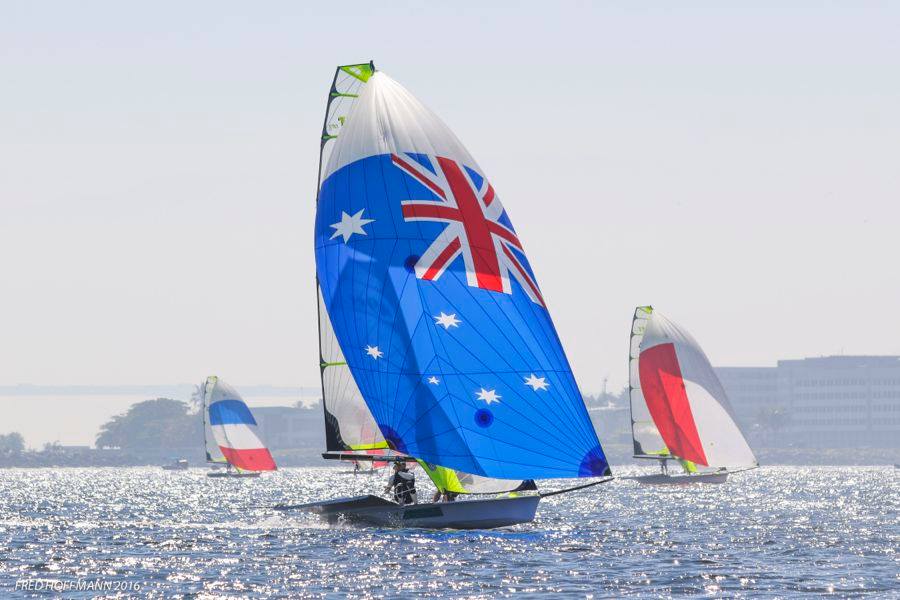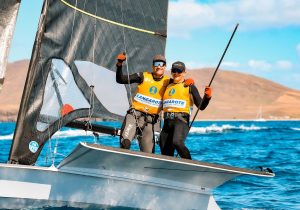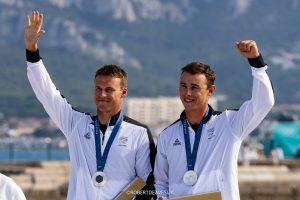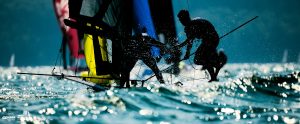2012 Gold Medalists Nathan Outteridge and Iain Jensen (AUS) have won the final warm up regatta before the 2016 Olympic games. The 2016 South American Championship was only a 2-day regatta, but the whole Olympic fleet and a few training partners showed up for the last test before the games. Outteridge and Jensen won the regatta through a tie break with Polish Olympic bound team of Lukasz Przybytek and Powel Kolodzynski. The Aussies had an excellent final day with a 1, 2, 2, to move up from fifth overnight into the lead by the smallest of margins.
These two days in mid July, with a similar tide profile as games days, were selected to be a short and sharp test of teams without cutting into their training plans.
The last regatta the Aussies won was the London Olympics. The duo were heavy favorites in 2012 and didn’t disappoint, winning the regatta before the medal race. They jumped straight into the America’s Cup after that, landing leading positions within Artemis racing and stepping back from their 49er racing.
Part of their step back from the top of the podium was by design, more recently it has definitely not been. Nathan was always very honest in 2013 and 2014, calling it the ‘off season’ of Olympic sailing. Outteridge and Jensen only sailed the big 49er regattas with modest amounts of training instead relying on their 2012 campaign skills. Their plan was to bring back up the intensity for 2016 and try to defend.
That’s when life got a bit in the way. For the 2017 America’s Cup, Artemis racing made Nathan head of sailing, a big position within any team with broad demands of time and focus. Meanwhile, 2012 Silver medalists Peter Burling and Blair Tuke kept their 49er campaign as their main focus and went on an unstoppable run, winning every regatta of the quadrennial. Outteridge and Jensen have had uneven results, often on the podium and only as low as 5th at a worlds, but a far cry from their form leading to London. The ever optimistic Outteridge must have started to doubt that coming all the way back was possible with so much going on in his life.
This winter the Outteridge and Jensen did more 49er training with a good set of young Australian training partners and also added more regattas to their schedule. The work is paying off just in time for the Rio games as they have created the conditions for what could be one of the most interesting regattas in Olympic sailing history. Normally sailing fans must wait until after Olympic careers to see America’s Cup helmsmen go head to head. Not in the 49er in Rio. Not only will there be two of the top America’s Cup Helmsen, the rest of the fleet are the stock of the next generation of AC and Volvo teams. Yet they are all racing head to head in similar equipment with nowhere to hide in the skiffs!
Burling and Tuke will be the favorites, but the Rio Olympics was always going to be the toughest test. Unlike London, the regatta length has been shortened from 6 days to 5. The schedule call for 4 days of 3 races per day plus a medal race for 13 races, down from the total of 16 races in London. The shorter a regatta is the greater the chance of an upset.
To exacerbate things, the odds of loosing race days is also higher in Rio than most locations. There are very short daylight hours and the race committee does not have the ability to run racing in the morning due to Navy controls. Catching up on races lost will be more challenging than normal.
That’s why the two-day South American’s were such an interesting regatta. In some ways it did a great job of mirroring the high stakes racing that will take place at the Olympics. The conditions over the two days were quite windy on day 1 and quite light on day 2. Dylan Fletcher and Alain Sign took a day 1 lead on the strength of winning the pin at the start on two of the three windy races. Then on day 2, it was quite light and flat, with the left side heavily favored for current relief. Outteridge and Jensen sailed solid upwinds and moved forward on the downwinds to squeak out the victory.
In other ways, however, the South American’s were nothing like the games will be. Teams sailed mostly with ‘blank’ sails, so no large sail numbers nor country flags as that’s the condition sails must be presented to Olympic measurement. It was a nightmare for the race committee, who had to get the races in while also trying to pick up premature starters in a sea of mylar. Dylan Fletcher told us the racing was “tight and tricky,” but more like a training regatta than a real regatta. While the South American’s being titled and scored is a bit more serious, there has been a lot of practice racing in recent weeks.
Rio is a very tricky place to sail meaning that luck may play a larger role in any individual race than more typical venues. If the top teams can’t predict what will be rewarded on the racecourse, then even great execution might not be enough to have a great race. Exagerating these effects are the extreme depth at the top of the 49er fleet. At least a dozen teams are able to win a day during the games, the first team to win a second day could become real contenders. The luck of a few starts and a few breaks in a short regatta can always make a difference, but Rio should be even more so.
The fact is, Burling and Tuke still finished 3rd at the South American’s and if there were 7 more races left in the regatta would still be heavy favorites to come back to claim top place. That doesn’t mean they would though. There is belief within the rest of the fleet that the Kiwi’s are beatable. For now, the effect of these South American’s will only harded up that belief, in no team more than Outteridge and Jensen!
Most teams have a day off following the South American’s followed by three more days of practice racing. The fleet will fly home then for some final time away from the boat park before returning for the main event. Join our newsletter to keep up with all the action.
The 49er Olympics start on August 12. Racing day are 12th, 13th, 15th, 16, with medal race on 18th.






